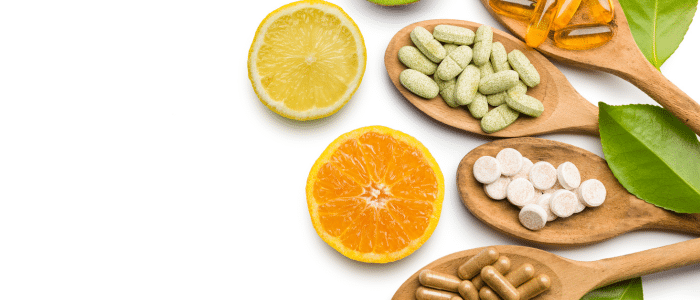Runners face unique demands, and they need proper nutrition to reach their maximum speeds while prioritising safety. You often hear about the role of protein in supporting athletic function, but vitamins also play an essential role in your overall health and performance. The best vitamins for sports help support the additional demands running places on your body, and they assist in recovery and general physiological function.
For a healthier brain, body, and better performance, let’s dive into how vitamins help athletes and which ones runners should prioritize.
Why Runners Need Vitamins
Anyone who participates in a sport benefits from increased nutrients, but only when that nutrition directly caters to their body’s needs. Runners place a strong demand on their bodies, so they need a well-balanced diet with ample vitamins to ensure that their muscles, lungs, and heart are supported.
There are many benefits to taking vitamins as a runner, including:
- Enhanced Endurance. B vitamins support the conversion of carbohydrates into usable energy. This can improve your energy levels during runs and offer greater endurance on the trail or track.
- Improved Muscle Function and Recovery. Vitamin D aids with calcium absorption, which helps support strong bones and muscle health. It can also support healthy muscle recovery after a run.
- Lower Risk of Injury. Vitamins support your body’s optimal function, including muscle health. The addition of vitamin C in your diet can help fight off inflammation and soreness, potentially lowering your risk of injury.
- Better Electrolyte Balance. Vitamins B6 and B1 impact electrolyte flow and production. Your body cannot produce B vitamins on its own, so you need to have supplements and a good diet to naturally support your healthiest electrolyte levels.
While a healthy diet is the best way to get all the vitamins and minerals you need each day, runners may also be able to benefit from a boost through vitamins or supplements. Consulting with your doctor beforehand can help you decide whether adding vitamins to your diet could be beneficial to your health and sport.
What Are the Best Vitamins for Runners?
Every human being has fundamental dietary needs, which includes core vitamins like A, C, D, K, and the B complex. However, everyone’s body is unique, and they should consider their personal needs before introducing supplements into their diet.
When considering the physical demands of running, especially when you’re training for a big race or marathon, there are several key vitamins that standout.
B Vitamins
Like we mentioned earlier, B vitamins are crucial to your wellbeing, and they play a large role in electrolyte balance, energy production, and muscle function. B1, B2, B3, B6, and B12 are your superstars. Many runners with a B vitamin deficiency struggle with fatigue, muscle weakness, and difficulty maintaining a steady stride
Vitamin D
Vitamin D is vital for calcium absorption, which supports healthy bones. Stronger bones can absorb more impact and protect your organs.Vitamin D also boosts muscle protein synthesis, ATP concentration, and can increase exercise capacity, among other perks [1].
Vitamin C
The immune-boosting vitamin can also work as an antioxidant, lowering inflammation and fighting off the cellular damage caused by exercise. By combating inflammation in the muscles, vitamin C may help lower the risk of a strain or overuse injury.
Vitamin E
Running temporarily weakens the immune system, which makes runners more likely to contract illnesses [2]. Vitamin E is also an antioxidant, commonly listed in supplements as alpha-tocopherol or gamma-tocopherol. It’s found in all cellular membranes, where it protects them against damage. Adding some more to your diet could help boost your immunity and protect against illness, especially after a race.
What Are the Risks of Taking Vitamins as a Runner?
Anyone considering vitamin supplements should carefully consider the ingredients in the formula. They must also identify their own health needs and risks to make informed decisions. If you’re ever unsure whether taking vitamins is the right call, consult with your doctor.
Usually, excess vitamins and minerals are flushed out of the body through urine. But too many can lead to an imbalance that causes side effects ranging from nausea to constipation and diarrhea. Vitamin toxicity could be more common among athletes who take too many supplements, supplement too frequently, or who combine high-dose supplements with vitamins in their diet. Furthermore, anyone taking medication could get clearance from their doctor to make sure supplements are compatible with their prescription.
Ultimately, consulting with your doctor before trying any new vitamins for sports people will help you get the greatest benefits and minimize any risks.
Choosing the Best Vitamins for Your Sport
A simple blood panel can reveal any vitamin deficiencies you have and steer you in the right direction. When choosing vitamins for athletes, look for ones that use natural ingredients, are low in sugar, and don’t contain GMOs or other synthetic additives.
You should closely consider your daily activity level, diet, and other lifestyle factors before choosing a multivitamin. In some cases, supplementing just one or two key vitamins or minerals could be more beneficial to you.
A doctor or nutritionist can help you identify your dietary needs better and make the best call for your health.
Fuel Up with Fixx Nutrition
At Fixx Nutrition, we believe that every athlete deserves to feel their best. That’s why we’ve developed a sports range to help runners, cyclists, and other sports people enhance endurance and boost hydration on the go. For additional health, wellness, and training tips, read the Fixx Nutrition blog.
Sources
2. https://runnersconnect.net/running-and-getting-sick-part-ii/


